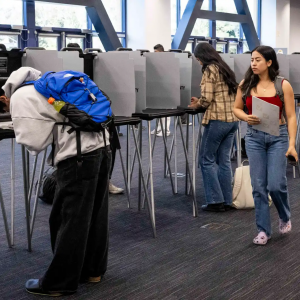
Moses had influence over the constitution of the United States— at least that is what students are being taught in Texas. The social studies textbooks being used in Texas were recently evaluated by a group of history scholars and were judged to be full of “religious and conservative biases that… distort history”. The resultant biases in these books are not a result of textbook publishing companies catering and pandering to their market, but instead an attempt to follow the standards set by the Texas board of education. The textbooks published in accordance to these standards would not be usable anywhere else in the country, thus special textbooks are printed for Texas. These stark differences in public school curriculum likely contribute to the strong polarization that exists in American society and politics today.
These scholars evaluated books that were published specifically for the state of Texas by textbook giants like Pearson and McGraw-Hill. These books included many biases and factually incorrect ideas, such as glossing over slavery and segregation. In the discussion of the Civil War, states rights are listed as a reason for the war before slavery is ever mentioned. In addition, KKK (Ku Klux Klan) violence, Black Codes and Jim Crow laws are not mentioned at all. Racial segregation is barely mentioned in the books and only in reference to integration of the armed forces. Even economic systems are recounted in a biased and distorted manner. Capitalism is presented as a superior system in high school and middle school textbooks. New York Times accused these textbooks of putting a “conservative stamp on history and economics.” However, this “conservative stamp” doesn’t exactly originate with the textbooks or their publishers, per se; these biases can be traced back to the curriculum standards set forth by government representatives like the Board of Education.
The State Board of Education in Texas has certain guidelines that must be followed in the compilation of content for textbooks. The textbooks published and used in Texas are written in compliance with these guidelines, which is perhaps the reason for the stark difference in content between these textbooks and the rest. The curriculum standards set by the Board of Education clearly promote capitalism as an economic system. The standards state that high school students should “understand how the free enterprise system drives technological innovation and its application in the marketplace,” and middle school students should be able to “compare and contrast free enterprise, socialist, and communist economies in various contemporary societies, including the benefits of the U.S. free enterprise system.” These guidelines have a clear conservative ideology with “minimal government intrusion, taxation, and property rights”. These biased guidelines extend to the role of religion as well. The social studies standards ask students to question the separation of church and state by comparing the wording of the establishment clause in the constitution (which prohibits a state religion) to the phrase “separation of church and state,” implying that the Founding Fathers’ views on a religious state might not be as strong as they are portrayed. Perhaps the most startling bias is the curriculum’s call for students to be able to identify Moses as an influence on the US Constitution. Dan Quinn, Communications Director for the Texas Freedom Network Education Fund, which commissioned the scholars to evaluate the textbooks, remarked that “it is absurd to suggest that Moses was a major influence on the Constitution and our constitutional structure of government.” Additionally, he noted that “every scholar we have spoke to has said that that’s just factually inaccurate.” These curriculum guidelines, which are supposedly responsible for the distortion of textbooks, were voted in by the Board of Education in 2010. The guidelines are believed to be biased and dangerous to factual history as Kathy Miller, the president of TFN, said in a press release: “… a number of textbook passages essentially reflect the ideological beliefs of politicians on the state board rather than sound scholarship and factual history.” In Miller’s opinion, the politicization of Texas textbooks is detrimental because students end up being taught political beliefs instead of facts.
Stephen A. Rosenbaum, the John and Elizabeth Boalt Lecturer at UC Berkeley who specializes in public policy, believes that political polarization is caused in part because of the politicization of school curriculum, which happens when education officials issue highly specific guidelines. “It is dangerous to start dictating specifics, instead of providing generalized guidelines,” Rosenbaum said in a phone interview. He believes that there should be a national federal standard set at a very generalized level which local school districts should be able to alter. As he puts it, “There is something to be said about national standards on science, social studies, literature, etc. But those standards should be supplemented by what local districts decide is important. The moment you say this is exactly what should be taught, you run into problems. Ultimately, we should encourage students to be critical thinkers.” In his opinion, this is a pressing educational challenge that must be addressed: “There are a lot of textbook purchases made in Texas, and Texas remains an influential market for publishers.” That Texas is such a populous and influential state might be the reason this issue has gotten so much notoriety.
The final vote on which books will be adopted in Texas will be held on Friday, November, 21st. Under a new Texas law, board members can only vote to reject books that have blatant factual errors or fail to meet at least half of the state’s requirements, meaning it may be too late to address some of the concerns raised. But this vote will be essential in deciding which “ideological beliefs” the students of Texas adopt.





Be First to Comment